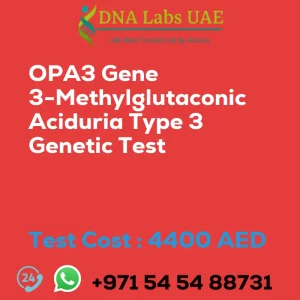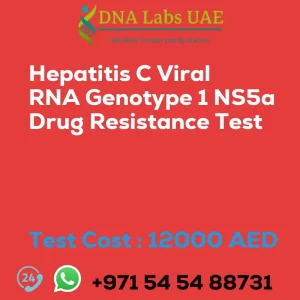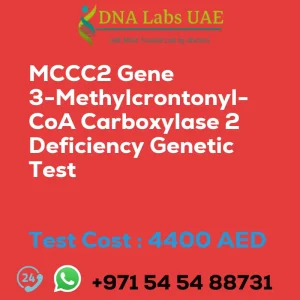HMGCS2 Gene 3-hydroxy-3-methylglutaryl-CoA synthase 2 deficiency Genetic Test
Test Name: HMGCS2 Gene 3-hydroxy-3-methylglutaryl-CoA synthase 2 deficiency Genetic Test
Components: Blood or Extracted DNA or One drop Blood on FTA Card
Price: 4400.0 AED
Report Delivery: 3 to 4 Weeks
Method: NGS Technology
Test type: Metabolic Disorders
Doctor: General Physician
Test Department: Genetics
Pre Test Information: Clinical History of Patient who is going for HMGCS2 Gene 3-hydroxy-3-methylglutaryl-CoA synthase 2 deficiency NGS Genetic DNA Test. A Genetic Counselling session to draw a pedigree chart of family members affected with 3-hydroxy-3-methylglutaryl-CoA synthase 2 deficiency.
Test Details
HMGCS2 gene (3-hydroxy-3-methylglutaryl-CoA synthase 2) deficiency is a rare genetic disorder that affects the body’s ability to produce ketone bodies, which are important for energy production. This deficiency can lead to symptoms such as low blood sugar, developmental delays, intellectual disability, and metabolic crises.
NGS (Next-Generation Sequencing) genetic testing is a type of genetic testing that uses advanced technology to sequence the entire coding region of a gene or multiple genes simultaneously. It allows for the detection of small genetic variations, such as point mutations or small insertions/deletions, which may be responsible for genetic disorders like HMGCS2 deficiency.
The NGS genetic test for HMGCS2 deficiency involves obtaining a sample of DNA, typically through a blood or saliva sample, from the individual being tested. The DNA is then sequenced using NGS technology to identify any genetic variations in the HMGCS2 gene that may be causing the deficiency.
This genetic test can help confirm a diagnosis of HMGCS2 deficiency and provide important information for managing the condition. It can also be used for carrier testing to determine if an individual carries a genetic variant for HMGCS2 deficiency, which may be important for family planning purposes.
It is important to note that genetic testing for HMGCS2 deficiency should be ordered and interpreted by a healthcare professional with expertise in genetics. Genetic counseling is often recommended before and after testing to help individuals and families understand the implications of the test results.
| Test Name | HMGCS2 Gene 3-hydroxy-3-methylglutaryl-CoA synthase 2 deficiency Genetic Test |
|---|---|
| Components | |
| Price | 4400.0 AED |
| Sample Condition | Blood or Extracted DNA or One drop Blood on FTA Card |
| Report Delivery | 3 to 4 Weeks |
| Method | NGS Technology |
| Test type | Metabolic Disorders |
| Doctor | General Physician |
| Test Department: | Genetics |
| Pre Test Information | Clinical History of Patient who is going for HMGCS2 Gene 3-hydroxy-3-methylglutaryl-CoA synthase 2 deficiency NGS Genetic DNA Test A Genetic Counselling session to draw a pedigree chart of family members affected with 3-hydroxy-3-methylglutaryl-CoA synthase 2 deficiency |
| Test Details |
HMGCS2 gene (3-hydroxy-3-methylglutaryl-CoA synthase 2) deficiency is a rare genetic disorder that affects the body’s ability to produce ketone bodies, which are important for energy production. This deficiency can lead to symptoms such as low blood sugar, developmental delays, intellectual disability, and metabolic crises. NGS (Next-Generation Sequencing) genetic testing is a type of genetic testing that uses advanced technology to sequence the entire coding region of a gene or multiple genes simultaneously. It allows for the detection of small genetic variations, such as point mutations or small insertions/deletions, which may be responsible for genetic disorders like HMGCS2 deficiency. The NGS genetic test for HMGCS2 deficiency involves obtaining a sample of DNA, typically through a blood or saliva sample, from the individual being tested. The DNA is then sequenced using NGS technology to identify any genetic variations in the HMGCS2 gene that may be causing the deficiency. This genetic test can help confirm a diagnosis of HMGCS2 deficiency and provide important information for managing the condition. It can also be used for carrier testing to determine if an individual carries a genetic variant for HMGCS2 deficiency, which may be important for family planning purposes. It is important to note that genetic testing for HMGCS2 deficiency should be ordered and interpreted by a healthcare professional with expertise in genetics. Genetic counseling is often recommended before and after testing to help individuals and families understand the implications of the test results. |







